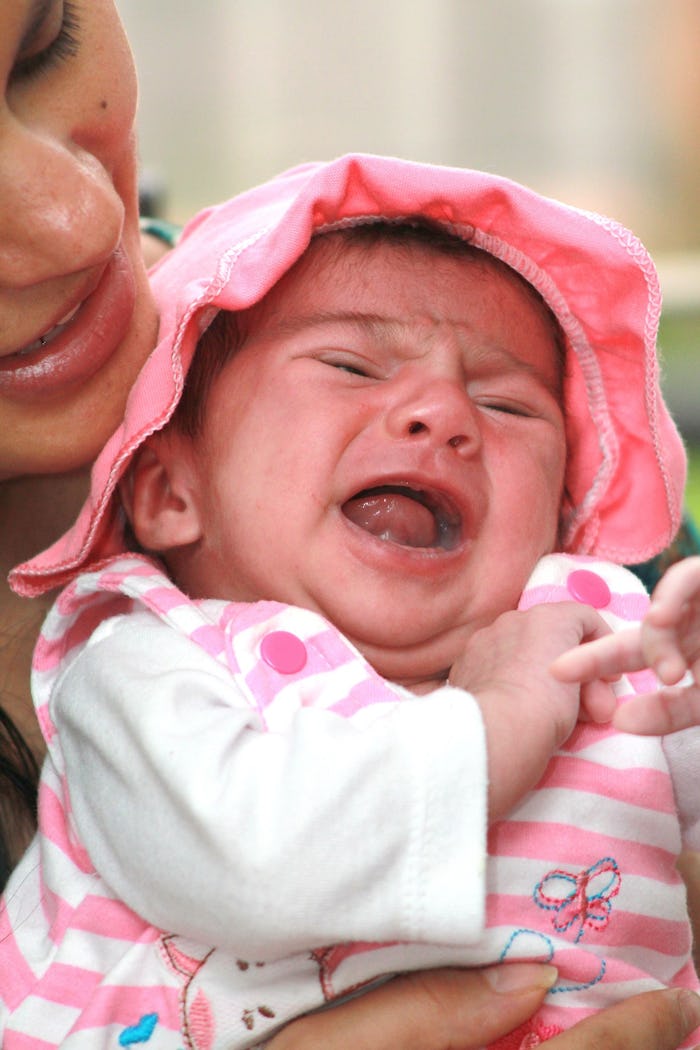Carrying a baby all day is physically and mentally exhausting. Arms, necks, and backs may actually begin to ache and throb after a while. Beyond avoiding possible soreness, parents simply need a sanity-saving break sometimes. Unfortunately, some of you might have babies that literally can't be put down or handed to another human being at all. So why does your baby cry when strangers hold them?
As a new mom, stressed and tired to the max, the only thing that gave me solace was gym time. I craved "me time" in those days and the only way I could get it was by dropping my baby off at the local YMCA childcare center where I had a membership. I was allotted two hours to either take a workout class, lift weights, or literally go to the ladies locker room and read a magazine in the steam room (I did the latter probably a lot more than any form of cardio). The only issue? I'd hand my baby over to the childcare workers and she would scream. It was frustrating to say the least. About 85 percent of the time I'd have to turn around in 15 minutes and go pick her up because she wouldn't stop crying.
One reason for her fits may have been baby stranger anxiety. According to Web MD, baby stranger anxiety presents itself anytime between six and 12 months. Basically your baby now has the brain capacity to understand the difference between you and a stranger. "An easygoing baby may go to anyone, but babies who are more discerning are likely to become more anxious around a stranger," Dr. Angela Reiter, a clinical psychologist, tells Romper. "This reaction is a natural and protective mechanism." She said your baby is probably showing signs of their independence by crawling or walking away from you to explore, but their stranger or separation anxiety kicks in to keep them from wandering too far.
The other explanation for a baby crying in a stranger's arms may have to do with something much more intuitive. "If your baby senses that you are anxious about how she will react to a stranger, she will mimic your anxiety and her response may be misinterpreted as sensing the bad in another person," Reiter says. A parent's reaction to a person, even if seemingly subtle, is paramount to the development of your baby's perception of that person. Author and pediatric expert Dr. William Sears made a similar point in Parenting which suggested that your baby will react to your anxieties — whether the fear is for a specific person or just the fear of leaving your baby with a person who is not you.
What if you think the person you want to hand your baby over to is good and you don't feel any reservations, but they still cry? Is it possible for your baby knows a bad apple?
"Studies have shown that babies as young as four to five months are capable of judging actions of others as right or wrong," Reiter says. She said this proves that we are all born with an innate sense of morality and therefore, a baby is capable of forming an opinion about another's actions to a certain extent.
Thankfully there are ways to calm your baby down when this happens. The most immediate way to soothe your baby is to simply remove them from the stranger's arms. You might even have to completely walk out of the room. If your baby is crying with a caregiver, Kids Health explained that babies can eventually adapt to strangers pretty well. You may have to practice leaving your baby with a caregiver in small intervals a few times to warm them up to the idea first before doing it for longer periods, but eventually they'll be OK. Rest assured, the stranger anxiety phase is simply that, a phase and generally speaking your child will outgrow it in due time.
